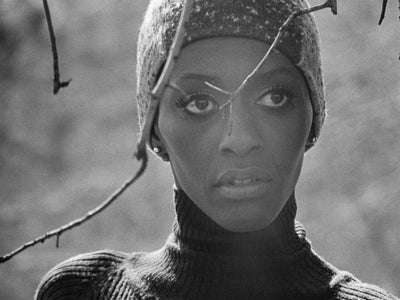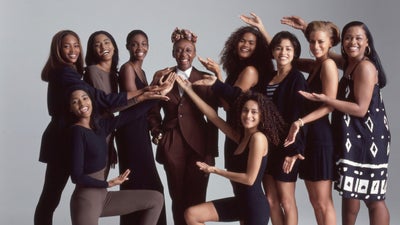
Bethann Hardison doesn’t like the word beauty. She told me as much the day after the premiere of her first film, Invisible Beauty, at the Sundance Film Festival on Saturday night. A documentary she co-directed with Frédéric Tcheng, the story centers on her life and contributions to the fashion world, and especially the rise of models with personality and notably Black models.
“We can talk about bodies, but beauty is not something I feel comfortable with, that’s something else,” she tells ESSENCE. “People always want to talk to me about beauty and that’s not my thing.”
 Bethann Hardison appears in Invisible Beauty by Bethann Hardison and Frédéric Tcheng , an official selection of the Premieres program at the 2023 Sundance Film Festival. Courtesy of Sundance Institute | photo by Oliviero Toscani
Bethann Hardison appears in Invisible Beauty by Bethann Hardison and Frédéric Tcheng , an official selection of the Premieres program at the 2023 Sundance Film Festival. Courtesy of Sundance Institute | photo by Oliviero Toscani
It’s a curious sentiment given that fashion and beauty in the minds of most people are inexplicably linked, as even the title of the film implies. Nonetheless, the storytelling of the project shows Hardison’s ascent into the fashion world, in which she broke boundaries as a Black model with what her friend and photographer Bruce Weber describes as an “interesting face” paired with an androgynous look, revealing that she was indeed among the models who pioneered it’s birth. Particularly notable in Hardison’s modeling career was the time she was a part of a cast of models who in 1973 went to France and partook in the Battle of Versailles show. Because of the inclusion ofBlack models like Hardison, the American showing stood out and was received well by the audience.
Hardison, of course, was more than a face of the fashion world, beginning with her pre-model career working in the garment industry to owning her own model agency after many years modeling, even being responsible for introducing Tyson Beckford to the world while contributing to the careers of household names like Naomi Campbell, Veronica Webb, and Iman.
It was, however, Hardison’s activism in the industry that cemented her position as a true advocate and icon in fashion, and one who had the power to change the industry in terms of representation. From creating the Black Girls Coalition in the late ’80s to returning in the post-2000s era to calling out the fashion industry’s racism — in no uncertain terms — Hardison has always been at the forefront of change and representation .
“It’s difficult to be an activist,” Hardison says, “It requires a lot of energy.”
Tcheng, who self-describes as someone who is “not a fashion guy” wanted to partner with Hardison, whom he met in 2014, because he fell in love with her personality as much as he did her story.
“The way that she tells stories is philosophical but also very funny,” Tchend said, adding, “I had to grow in order to make this film.”
Growth and consciousness of the industry’s relationship to Black models, due to the work of Hardison, features strongly throughout the film. The project also depicts her complex upbringing and adult experiences, including her life as a mother who raisedKadeem Hardison, who went on to be an actor, notably starring in A Different World.
Throughout the film, Hardison is direct and authentic about who she is, what she’s won, and even what she’s contributed. That includes, perhaps the topic of conversation that this film will be most likely to stir the most, representation. In that respect, Hardison is not only trying to make space for Black people but for everyone.
“It’s not the Black community, it’s not the white community,” she says. “It’s about the community, the global community.”
TOPICS: bethann hardison Sundance Film FestivalThe post In ‘Invisible Beauty,’ Fashion Icon Bethann Hardison Tells It Like It Is appeared first on Essence.


0 Commentaires